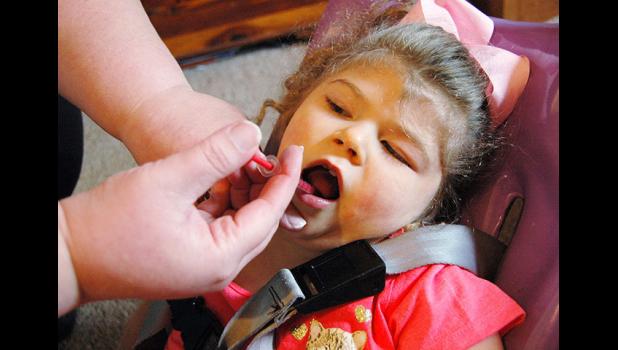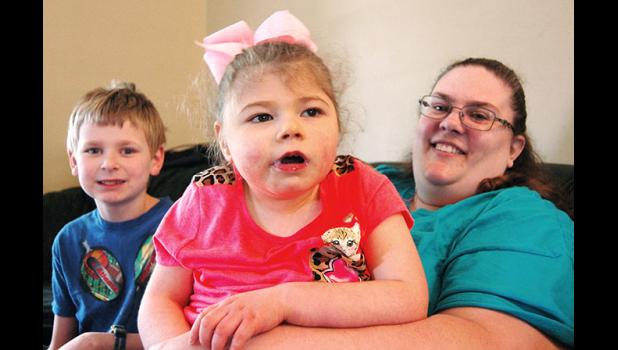When TLC needs more THC
By ANDREW MCGINN
a.mcginn@beeherald.com
One doctor offered to sedate her. Another wanted to prescribe hydrocodone, a potentially habit-forming opioid.
Amy Purdie just wanted to end her daughter’s anguish — Autumn Grace, who had been born dead to a drug-addled mother in Florida, who was enduring as many as 60 seizures a day and was written off by foster care as unadoptable, was in the throes of a neurological storm.
For 240 straight hours — 10 whole days — Autumn screamed and cried from the chaos erupting inside her tiny body.
But even at her most desperate, Purdie knew there had to be a better way to lessen her daughter’s pain.
“Who wants to sedate their kid?” she asked.
“Hydrocodone? She’s 2,” Purdie recalled, still disgusted.
Purdie began thinking about the little, two-ounce glass bottle of botanical oil she ordered off the internet from Colorado for $170.
It had been sitting there in the house the whole time, but Purdie, a registered nurse and a lifelong Jefferson resident, hadn’t been able to work up the courage to use it.
Finally, she took a 1cc oral syringe, just half full of the oil, and squirted it under Autumn’s tongue.
“That first dose you give is probably the scariest thing you’ll ever do,” Purdie, 38, confessed.
Miraculously, the neuro storm subsided.
After four doses, Autumn was awake and more alert than ever.
“And her seizures,” Purdie said, “slowly started stopping.”
Now 5, Autumn receives two to three doses daily of Haleigh’s Hope, the oil marketed as an organic, non-GMO therapeutic plant extract.
The plant in question is marijuana.
It’s doubtful Autumn will ever be able to pass a random drug test — she would invariably test positive for THC, the psychoactive compound that produces the “high” for pot smokers.
Because there’s so little THC in the oil, it’s perfectly legal to possess.
“You could drink this entire bottle and not get high off it,” Purdie said.
But advocates argue that higher THC levels are needed to make legal medical cannabis worthwhile for patients in pain and suffering from muscle spasms.
Medical cannabis officially goes on sale Dec. 1 in Iowa at five state-licensed dispensaries for a limited number of medical conditions, including cancer, but Purdie is among a growing number of people who believe the state could nanny the fledgling industry to death out of social and political fears.
Under the law passed in May 2017, only cannabis products containing high levels of non-psychoactive cannabidiol (CBD) and low levels of THC will be permitted for dispensing in Iowa.
Legislators placed a cap on THC of no more than 3 percent. Cannabis still can’t be smoked.
Even MedPharm Iowa, the Des Moines company selected by the state last year as the first of Iowa’s two licensed pot growers, has gone on record as saying that Iowa-made CBD will be ineffective in treating patients until the law changes.
By comparison, recreational weed — “good market pot,” in the words of High Times magazine — has a THC level of 18 percent.
Autumn has responded so well to a cannabis product with trace amounts of THC, her mom said, that it’s possible a higher level of THC could free her completely of the seizures that have robbed her of the ability to walk and talk.
“People who are wanting it for recreational purposes, they already have it,” Purdie said.
‘Let the doctors figure it out’
In the process, Purdie has become an unexpected activist for medical marijuana, a product of the D.A.R.E. generation who has come to question why marijuana is still considered by the federal government to be a Schedule I drug with supposedly no accepted medical use.
Her stance is at odds with the local lawmakers she contacts with Autumn’s story and picture, “just to get that human factor out there.”
“Steve King sends back a nasty email,” Purdie said of the area’s Republican representative in Congress.
King, she said, accuses her of just wanting to get her daughter “high.”
“I wish I would’ve paid better attention to Government in school,” said Purdie (maiden name Mobley), a 1998 graduate of Jefferson-Scranton High School.
She thinks it’s ridiculous that Iowa legislators — not doctors — are the ones currently dictating how much THC can be in medical cannabis.
Purdie wants doctors in the state to have the same dosing authority they have over Vicodin or any other prescription drug.
“I don’t have to vote to see that she can continue her Onfi,” she said of her daughter’s seizure medication, a “benzo” in the same class as Xanax and Valium.
“You’re not going to dose a kid to get them high,” she added. “You’re going to dose them until they’re not having symptoms.”
The Iowa Legislature closed session on May 5 without revisiting the medical marijuana issue — an about-face orchestrated by House Speaker Linda Upmeyer, R-Clear Lake, a nurse practitioner, with the support of Republican Gov. Kim Reynolds.
On April 24, state senators introduced Senate File 2405, which would have eliminated Iowa’s 3 percent cap on THC and made medical cannabis available to any patient with multiple sclerosis. It wasn’t taken up.
That was fine by state Rep. Chip Baltimore, the Boone Republican who represents Greene County in the Legislature.
“I am opposed to medical cannabis until such time as the federal government changes the classification for marijuana from a Schedule 1 drug to a Schedule 2 drug,” Baltimore said. “At that time, scientists and doctors can complete the appropriate studies and research to make sure the product is safe and will help what it can help.”
While more than 40 states now allow for some form of medical marijuana or CBD for epilepsy — eight, including Colorado and California, have legalized recreational weed — cannabis is still illegal under federal law, impeding research.
“It puts parents in a position they don’t want to be,” Purdie said.
The law may say one thing, but mounting evidence suggests that cannabinoids — the substances found in the cannabis plant that act on cells — can help in controlling seizures.
Autumn has what’s known as Lennox-Gastaut syndrome (LGS), a severe form of epilepsy prevalent in 1 out of 100,000 children that will require lifelong treatment.
“If you look up kids and seizures, medical cannabis comes up at the top of the search bar,” Purdie said.
She admittedly did hours of research, hesitating for a good six months before finally placing her first order over the objection of Autumn’s neurologist.
“It’s scary to take that leap,” Purdie said. “First of all, is it even legal? Are the cops going to knock on the door?”
Despite being a legal product, Baltimore urges caution.
“It is imperative with medical cannabis to develop it as a drug just like every other drug, to make sure it is safe, it is used for the proper things and in the proper doses,” he explained. “As a state, we should not encourage parents to just experiment on their children with this drug.”
But for Purdie, there’s no going back.
Before discovering medical cannabis, Autumn was on 10 different prescription medications, including some just to alleviate the side effects of others.
She was still experiencing 50 to 60 seizures a day, a terrible toll on a little brain that has left her with intellectual disabilities.
“At that point,” Purdie said, “she had no quality of life.”
She now takes just two seizure medications and her medical cannabis. The seizures have been reduced to one or two a day, Purdie said, and she even experienced a nine-month stretch without a single seizure.
Purdie is the first to admit that if someone would have told her three years ago that a $170 bottle of botanical oil could have done this, “I would’ve laughed at you.”
“It’s like all those diet drugs that are supposed to be a miracle cure,” she said.
Autumn’s neurologist is now a believer as well, Purdie is proud to say, and has since vowed to sign for the state-issued medical cannabis cards that will be needed to buy CBD in Iowa later this year.
“She looked at me and said, ‘You got me,’ ” Purdie said.
It’s not the first time Purdie has persisted.
‘It always works out’
A recently divorced, single mother of eight, she and her then-husband began thinking about adoption after the birth of their first child, daughter Kierstin.
“I went into it just wanting another child,” Purdie said.
What Purdie had in mind was a “perfect, newborn baby” — what they ended up with were seven special-needs kids, all adopted through the foster care system.
“All of my kids are born drug exposed,” she said matter-of-factly. “They’re going to struggle the rest of their lives with that.”
And that’s nowhere near the worst of it.
Two of her daughters — sisters who came to Jefferson from the Des Moines area — had previously been sold for sex by their birth parents, Purdie said.
For a time, Purdie feared the parents might come for the girls.
“That was their income,” she said, “and we took that away from them.
“They’re not supposed to have our address, but it’s Jefferson. It’s not hard to figure out where we live.”
The girls arrived at their new home with trust issues. One refused to shower. Both have PTSD.
“These kids, they need somebody that, number one, loves them, supports them and will advocate for them,” Purdie said.
Frankly, Purdie has never known a house that isn’t crammed full of kids — her mom has operated an in-home day care locally for 40 years.
Purdie’s eldest daughter, Dolly George, who came to Jefferson when she was 16, went on to earn a bachelor’s degree in art from Graceland University in Lamoni.
“She pushed every limit we had,” Purdie said of Dolly. “We’re talking cars and driving and proms.
“She broke us in.”
It was Autumn Grace, however, who almost broke them.
Born in Florida via an emergency C-section to a mom drunk and high on a cocktail of narcotics and meth, Autumn was stillborn, Purdie said.
For 11 minutes, she said, Autumn had no heartbeat.
Purdie adopted Autumn when she was 17 months old, but just one month after her arrival in Iowa, they were back in a hospital.
Doctors at Blank Children’s Hospital in Des Moines insisted that Autumn would never amount to anything but a vegetable. Social workers began making visits to the room to make plans for Autumn’s future.
Purdie, too, began to question her willingness to bring Autumn home.
“I looked down,” she explained, “and our eyes kind of connected.”
“She needs somebody who’s going to fight for her,” Purdie remembers thinking at that moment. “She’s got more in there than these professionals are believing.”
It’s doubtful she’ll ever walk or talk.
“It was my goal,” Purdie said, “to give her the best quality of life she could have.”
In Purdie’s mind, there’s no question: Medical cannabis with even a trace amount of THC has already improved her daughter’s quality of life.
Baltimore said he unfortunately sees the social climate changing in Iowa for marijuana.
“I think, eventually, marijuana will probably be legalized,” he said, “and I believe that will be a terrible mistake when it is.”
Baltimore previously announced he isn’t seeking re-election in November after four terms in the Iowa House. He made news in January when he was arrested for driving drunk.
“This year, voting is going to be different,” Purdie vowed. “This year, it’s going to be finding out who supports medical cannabis.”
- Log in to post comments




